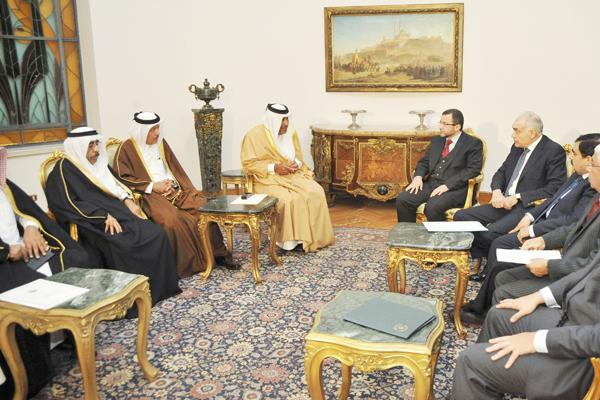
The ruling families of Qatar and the United Arab Emirates have staked out opposite poles in relation to Egypt’s Muslim Brotherhood. The Egyptian press reported on January 8 that visiting Qatari Prime Minister Hamad Bin Jassim al-Thani announced additional economic support for Egypt: a new $2 billion deposit in the Central Bank (although it does not appear to be successfully shoring up the ever-weakening Egyptian pound) plus a $500 million grant. This brings Qatari assistance to Egypt to $1 billion in grants and $4 billion in Central Bank deposits since August, 2012, when the Emir of Qatar paid his first of two visits to meet with President Mohamed Morsi. That al-Thani made the announcement in Cairo also sent a strong message that Qatar intends to continue to offer political support to President Morsi’s increasingly Islamist government.
The timing of the announcement, accidental or not, followed on the heels of another dustup in Egyptian-UAE relations due to the Dubai arrest of eleven Egyptians in the last days of 2012. Although the actual charges are not clear and may not yet have been filed, unnamed UAE officials have alleged that the arrested Egyptians belonged to a cell linked to the Muslim Brotherhood. Egyptian Brotherhood officials have confirmed that some of those arrested are members of their group. Senior Egyptian officials flew to the UAE to petition for their release, but to no avail.
The aid vs. arrests reaction reflects two very different attitudes about how best to preserve the influence and the current governing arrangements of two of the richest countries in the world. For the last several months, the UAE establishment has launched a well-coordinated public and private campaign against the Egyptian Muslim Brotherhood, depicting it as an evil influence intent on “threatening UAE sovereignty,” or in other words taking over the country. In the latter half of 2012 Emiratis and some Saudis were arrested, accused of having links to the Brotherhood. The campaign has also included pointed public and private criticism of US attempts to come to terms with the Brotherhood-dominated elected government in Cairo.
The Qataris, who in the past have sometimes gone their own way in order to demonstrate that they are capable of doing so, have a much less troubled history with the Muslim Brotherhood. Qatar has hosted spiritual leader Yusuf al-Qaradawi and Hamas leader Khalid Mashaal after he fled Damascus. Whether the Qatari rulers feel a deep spiritual kinship with the Brotherhood is unclear, but they do see the group and perhaps even more conservative Islamists, as having a role to play in the future of the region. This has prompted the Qataris to support the Brotherhood and other Salafi groups not only in Egypt, but also in Tunisia, Libya, and Syria.
The leaders in Qatar and the Emirates have consciously and actively made themselves more than bit players in a major drama—the fight for the future of the Middle East. Both countries have been active in influencing the unfolding stories in Egypt, Libya, Tunisia, and Syria. Official aid is just part of a broader effort that includes the use of regional media, close security/intelligence ties and links to non-official groups, as well as lobbying the United States and other powers. This drama is likely to play out over decades. Although major players are involved, including Saudi Arabia, Turkey, Europe and the United States, these two actors in the Gulf are playing an outsized role to shape perceptions about the political contours of the Arab revolutions and influence their outcomes. They realize that the security of small wealthy states in their neighborhood is not assured, requiring them to pursue activist survival strategies.
Richard LeBaron is a senior fellow with the Rafik Hariri Center for the Middle East working on the Gulf region as well as leading a joint initiative with the Brent Scowcroft Center on International Security, A Strategic Dialogue for a New US-Gulf Partnership.
Photo: Reuters
Image: Qandil%20Al%20Thani%20Reuters.jpg
